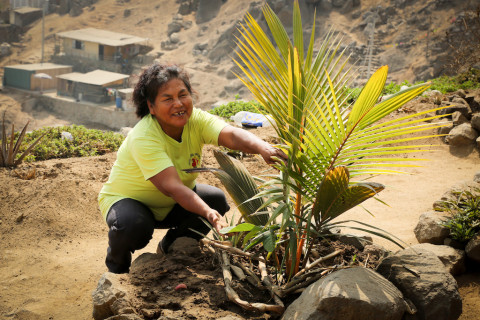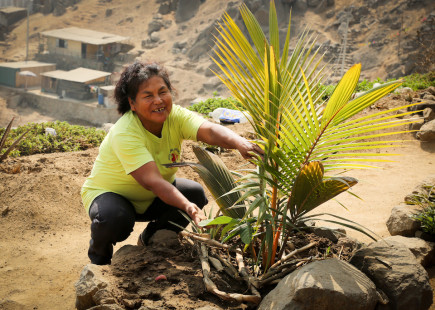Ideas into movement
Boost TNI's work
50 years. Hundreds of social struggles. Countless ideas turned into movement.
Support us as we celebrate our 50th anniversary in 2024.

The solution approach may catalyze debate and galvanize everyone involved in the SDGs into action, but it eclipses opportunities that stretch beyond the problem-solution discourse.

‘Creating a push for momentum on implementation of the SDGs. Calling for sustainability. Mobilizing innovative solutions for the global goals’ – debates around the Sustainable Development Goals (SDGs) framework adopted in September 2015 are at fever pitch. The global community is on a scavenger hunt for implementation solutions. Should it be about technological innovation, financial investment, or business stakeholders pouring in fresh ideas? The concept of ‘solution’ has become so integral to the SDGs that a Solutions Summit was hosted early last year.
Although the solution approach might catalyse debate and galvanize everyone involved in the SDGs into action, it eclipses opportunities that stretch beyond the normative problem-solution discourse. As Siobhan Airey, postdoctoral fellow at the Transnational Institute (TNI) focusing on the international governance of the SDGs financing, explains, the goals provide ample space for contestation and stakeholder engagement. Like any governance instrument, they are open for interpretation and can propel progressive ideas to the fore. At this momentous point, the global community can steer off the well-trodden neoliberal path and lay foundations for alternative modes of governance, participation, financing, and ideas about development.
Currently the SDGs’ governance is powered by the transition from the old western orthodoxy of multilateralism to the forces of multistakeholderism. The latter, being leveraged by market capitalism, exhibits severe deficiencies on the fronts of inclusivity, accountability and transparency. As a result, the common ground for cooperation and collective action has shrunk. The SDGs as a framework can offer leverage for global governance and facilitate transitions to alternative shared value systems. Firstly, it can bring human rights into the spotlight and mobilize governance structures around this vital issue. A lot remains to be done to make the existing human rights regime more effective. The global potency of the goals can address the centrality of human rights, making them the focal point of governance. Secondly, human rights approach can inspire another value system and an instrument of social cohesion within the SDGs, namely social and environmental justice. Stepping beyond Goal 16 – Peace, justice and strong institutions – the SDGs can engineer other mechanisms for conceptualizing justice. They might include addressing the unequal distribution of environmental harms, fair and meaningful participation in environmental decision-making processes, recognition and protection of indigenous ways of knowledge.
The seismic shift from international to global governance and the emergence of multistakeholderism entails an increased involvement of non-state actors in norm- and rule-setting processes. Presently, a triad of actors is officially involved in global governance of the SDGs: states and intergovernmental organisations; market stakeholders (the business sector); civil society actors. The SDG doctrine puts market actors in the driving seat, thus perpetuating the neoliberal model of development and ensuring predominance of business and corporate interests. However, the governance of the SDGs also implies multilevel governance: governance takes place not only at the national and international level but also at the subnational, regional, and local levels. SDGs as a governance framework can promote unconventional alliances and accentuate their benefits. The Western Climate Initiative is a prime example of that. It is a collaboration between western American states and Canadian provinces to tackle climate change at a regional level. The alliance aims to develop emissions trading program policies and harmonize members’ jurisdictions. The Western Climate Initiative shows that an international agreement can be created without the backing of national governments.
In a similar vein, NGO coalitions are becoming more prominent, as they converge to advocate for some of the most pressing issues. Last year 76 environmental and human rights organisations presented a letter to Pope Francis, condemning violence against environmental defenders. As civil society groups bolster international cooperation through the active mobilization of public support for vital causes, their role in governance deserves to be strengthened and formalized.
The spectrum of ‘solutions’ and proposals for financing global development is strikingly broad. In the case of the Millennium Development Goals (MDGs), solutions focused on foreign aid and debt relief. The arrival of SDGs catapulted the global community into a period of relentless search for “trillions” of dollars for the Goals’ implementation. Thus far, the financing agenda has been hijacked by private actors, brainstorming the regulation of financial flows. However, there is strong potential for re-orientation of the existing financing status-quo towards resolving the existing power imbalances.

One strategy is premised on the notion of ecological debt – the responsibility that industrialized countries, their institutions, banks, and corporations have for the gradual appropriation and control of the world’s natural resources and the destruction of the planet caused by their patterns of production and consumption. The term was coined during the 1992 Earth Summit in Rio de Janeiro. The existing numbers behind debt calculations are head-spinning. For instance, the study conducted in 2008 included such damages as greenhouse gas emissions, ozone layer depletion, agriculture, deforestation, overfishing, and the conversion of mangrove swamps into shrimp farms. It counted US$1.8 trillion in concrete damages over several decades (1960s – 2000). One should bear in mind that the study did not encompass excessive freshwater withdrawals, destruction of coral reefs, bio-diversity loss, or invasive species, among other damages. The SDGs are well-suited to draw the global community’s attention to these woeful episodes of uneven economic and ecological exchange and nature exploitation, and construct action strategies through the mobilisation of the concept of ecological debt. The latter can become a useful mechanism for the SDG implementation in countries that suffered damages listed above.
Alternative interpretations of the SDGs can also swing the pendulum in the direction of a fairer, more just, and environmentally conscious model of development. Rather than treating growth as a paragon of development excellence, the global community might turn to a more crucial notion of well-being. One of the alternative development ideas epitomizing this notion is the de-growth movement, defined as ‘deliberate and planned downscaling of production and consumption that increases human well-being and enhances ecological conditions and equity on the planet.’ De-growth not only challenges the centrality of GDP growth as an overarching policy objective but proposes a framework for transformation to a lower and sustainable level of production and consumption. It entails shrinking of the economic system to leave more space for human cooperation and ecosystems.

Another vision the SDGs can take on board is Buen Vivir (Spanish for ‘living well’), denoting individual well-being within a community in relation to a specific cultural-natural environment. It builds on the knowledge of indigenous communities in South America to create new social and ecological realities that are community-centric, environmentally balanced and culturally sensitive. Buen Vivir is at odds with free market environmentalism popularized by the UN. In addition to De-Growth and Buen Vivir, there is an abundance of other conceptual paradigms for development such as Indian Radical Ecological Democracy, South African Ubuntu, Ugandan Umuntu, etc. that are worth our exploration.
‘Global’ is the defining characteristic of the SDGs, and they should not morph into a vision honed solely by the UN, private actors and Western governments. It is high time for the SDGs to endorse and promote the ideas that would benefit the majority, and not only the privileged few.